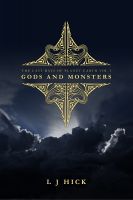When you are afraid to dream, you value your consciousness. FBI agent Jack Abrahams is afraid to dream. The recurring nightmare that haunts his sleep fills him with fear and dread. When reality starts to twist and turn, playing out a series of bizarre events, Jack is asked to investigate them. A priest, nailed to the side of a log cabin and a homicidal biker are just the beginning of these strange events. Fellow agent, Helen Foster wants to travel to England to investigate a man called Adam Blake. Helen suspects that Blake was responsible for the mock crucifixion of the priest but Jack is reluctant to begin the investigation. He changes his mind when he sees a photo of Blake, the man who lives in his nightmares.
The Last Days of Planet Earth is an amusing and interesting re-working of history, myths and religious icons, with references to popular culture threading neatly throughout.
RETAIL OUTLETS FOR THE LAST DAYS OF PLANET EARTH VOLUME I
PROLOGUE
"The blame for Armageddon lies on man.
And the millennium will come only when the average man exhibits a scientific integrity about all he is and does--instead of half of it.
Many a psychological Archimedes has put signposts on the hard road man must follow if he is to avoid self-destruction and come into his own.
A few very great modern scientists have added to the lore.
Indications of what man may expect of himself are everywhere at hand.
But most men must first be persuaded that the task lies ahead and not behind--that we are infants still, with loaded guns for toys."
PHILIP GORDON WYLIE
GOLGOTHA
33 AD
A solitary man trudged along the dusty road that circumvented the small cemetery. The cemetery stood at the bottom of a hill that resembled the physical features of a skull. The man wondered how the forces of erosion and time had conspired to produce this natural sculpture. The horsehair crest on his helmet and the mail armour shirt were the attire of a soldier. A long flowing cloak that would have graced any state occasion trailed behind him as the soldier continued his walk, accompanied by his shrill and loud whistling. His sword hung on his left side and his dagger was sheathed on the right side. He tapped the ground with the crooked but ornate stick that occasionally received a baton twirl around his head. The considerable amount of phalerae he wore indicated the number of battles this particular soldier had participated in.
Crows circled the hill in front of him and filled the air with their cries as if mourning the passing of a soul. The skies were dull and grey, although, no thunderclouds were in view and there was no sign of rain. The air around the man bristled with static electricity, which crackled as he walked towards the hill. The area itself was quiet. Only the screeching of the crows broke the silence. He smiled and raised an eyebrow as he reached the foot of the hill because now he could see the tops of the wooden structures that broke the horizon and he could hear the soft moaning of human suffering. Yet there was still a fair distance to walk as the road continued upwards on its spirally route towards inhumanity, desperation, and death. The soldier’s eyes lifted towards the skies, displaying his yellow pupils for a brief second or two as electricity crackled and popped in the air around him. He resumed his whistling, which became increasingly pronounced and discordant as he neared his destination.
Two soldiers stood either side of the road, guarding the approach and observing the passers-by, making sure that nothing untoward was about to occur. When they observed the man strolling towards them, both guards stood up straight and made sure their weapons were sheaved correctly whilst straightening their armour and cloaks to make themselves look more presentable. They looked at each other and then walked down the hill towards the whistling soldier.
The soldier looked up and saw the two guards. He smiled to himself and tightened his grip on the stick. Electricity crackled around his fingers. The crackling stopped when the guards joined him. The guards now stood directly in front of him, raising their hands to salute the soldier.
“Centurion!” one of the guards said. “My name is Gaius Rustius. How can we help you?”
“Seriously?” asked the centurion.
“I have given you my name. I would have yours and know your intent,” said Gaius.
“My name is Lucius Curiatius Priscus. I command one thousand men of the Roman infantry who wait patiently for my return. I have come to see the one some call saviour.”
“I would ask what it is that you want of him, centurion. We have been told to keep a strict eye on him,” said Gaius.
“And yet you elevate him by the side of a road for all to see. On my way here, I have seen soldiers forcing the natives of this place to take this road when there are other routes to use. They do this so that the people witness his suffering. Yet you question my right to pass by him despite my rank and standing in Rome?” said Lucius.
Gaius looked nervous and offered an apology.
“Forgive me, centurion, but there is much talk of this one. You may proceed,” he said.
Lucius offered his thanks, and Gaius moved aside to allow him to pass.
Lucius resumed his walk along the path. Eventually, he reached the line of crosses that held the suffering men. He paused at each cross, paying his silent respects to the dying until he reached the man on the fifth cross. Lucius knelt in front of the suspended man.
“These people call this justice. I call it barbarism,” said Lucius.
Lucius kneeled down and smiled as he spoke. The man on the cross opened his eyes slowly and gazed upon the Roman in front of him. He smiled gently and addressed the kneeling soldier.
“I have been here a long time, brother. You wait until now to come and see me? You carry the tone of defiance but wear the uniform of compliance. Tell me what you call yourself,” said the man.
“Lucius Curiatius Priscus. It’s very Roman. I was not sure you would want to see me. All the same, when the mighty civilisation of Rome deems it necessary to nail you to a cross, I feel I have little choice but to come and take a look.”
“Just that, you just want to take a look?” asked the man.
“I have an army of two-hundred men a little over a mile from here. They would burn Rome itself to the ground should I command them to. Let me take you from this place and you can return home, free from this pointless torment,” said Lucius.
“In exchange for what?” asked the man.
“You know what I want. The one thing that I want,” said Lucius.
“You cannot go home. You made your choice a long time ago,” said the man. “I cannot offer you a deal.”
“At least let me free you from this. It is…undignified,” said Lucius.
“No. This is my choice. I am here to show them that death is not the end. I will die very shortly, be taken from this cross and placed in a garden tomb. After three days, I will rise and leave the tomb proving to the mortals that death is merely a transition. I will spend forty more days reinforcing this message before ascending and returning home. Once they have witnessed this, they will realise their time here is not fleeting and that they will be here long enough to witness the fruit of any actions that will damage the earth, other species or themselves. They will know that accountability is not avoided through death. I do not need rescuing. Joseph will ask for my body from Pilate when the time is right. You understand?”
“Pilate? The man who allowed this?” said Lucius.
“He argued against it,” said the man.
“He gave in to the mob, though. He did what they all do. Run scared of the majority,” said Lucius.
“What choice do any of them have?” asked the man.
“They could be brave enough to be the men they imagine themselves to be. Where are your followers now? The ones you place so much faith in, where are they? In what world is it right for one man to torture another? They will not understand what you are going to do; they will misinterpret it like they always do. You cannot even force sentience on these primates. They are not ready. If they believe there’s no death, then what do they have to lose? Carnage, murder, slaughter, rape, and genocide, where would it end?”
Lucius stopped his rant, transfixed by the sign that hung over the head of his brother.
“King of the Jews? So, who is the king of everyone else?” asked Lucius.
Lucius looked up at the man on the cross and realised that there would be no reply. The man hung lifelessly; a single tear falling on the kneeling Lucius.
Lucius patted the leg of the dead man.
“I guess that would be me then,” said Lucius.
Lucius reached inside his cloak and produced a golden chalice. He held the chalice below the body until a single drop of blood fell into it. He smiled as the blood soaked into the chalice and disappeared from view. The silence was broken by the sound of shuffling behind him. Drawing his dagger, he lurched to his left, snarling as he caught the hooded figure by the neck and drew the blade close to his throat.
“Don’t kill me! Don’t kill me!” shouted the figure.
Lucius pulled back the hood to reveal a young man. In his hand, the man carried just a gourd of water, nothing else, no weapon. Lucius relaxed his grip and stood the man in front of him.
“What were you thinking?” asked Lucius.
“Forgive me, sir, but I have brought water to ease the suffering,” said the young man.
“You charged up the hill, armed with a gourd of water, to give relief to a man you did not know? You would risk death to do this?” asked Lucius.
“It seemed the right thing to do. This crucifixion is barbaric and unworthy of us all.”
Lucius placed his hands on the young man’s shoulders and smiled.
“I am afraid you are too late. Our brother has gone. What is your name?” he asked.
“My name is Ben Ezra,” the young man replied.
Lucius smiled and removed his hands from Ben Ezra.
“I have searched for someone like you for so long, Ben Ezra,” said Lucius.
Lucius grabbed the hand of Ben Ezra and drew the knife across his palm. Ben Ezra struggled but Lucius was too strong. He held the hand of Ben Ezra over the chalice until the blood found the bottom of the vessel. Ben Ezra tried to call for help from the guards but Lucius clamped a hand over his mouth.
“Don’t be afraid. This is a gift for you because you have shown compassion today,” said Lucius. “Will you be quiet?”
Ben Ezra nodded his head and Lucius relaxed his grip. Still holding Ben Ezra’s hand he folded the fingers, forming the hand into a fist. He smiled at Ben Ezra and unfolded his fingers. Ben Ezra gasped when he saw that the wound had gone.
“How?” whispered Ben Ezra.
“There is a little more,” said Lucius.
Lucius placed three fingers on Ben Ezra’s neck.
“This might sting a little,” he said.
Lucius forced his fingers into Ben Ezra’s skin. Ben Ezra convulsed as electricity filled his body. When he fell to the ground, the pain stopped. He grabbed the hand of Lucius, who pulled him to his feet.
“I don’t understand, what was that?” he asked.
“In time, you will understand,” said Lucius. “Now return to your family and give the water to them.”
Ben Ezra turned and ran back down the hill. Although Lucius caused him no lasting harm, he still moved quickly, afraid that Lucius would give chase. He would have been more afraid had he been able to see the three glowing circles that now adorned his neck. Resisting the urge to turn and see if Lucius was still watching him, he carried on running.
Lucius turned and shouted to the guards at the bottom of the hill.
“GAIUS RUSTIUS!”
The air crackled and warmed as Gaius made his way towards Lucius. He was terrified but knew that the sooner he responded, the better it would be for him.
“Gaius! Inform Pilate that the King of the Jews is dead.”
“Yes, of course, immediately,” said Gaius.
“There is something else,” said Lucius.
Lucius reached beneath his cloak. He produced the chalice, detailed with hieroglyphic symbols and inscriptions, and handed the chalice to Gaius.
“Guard this with your life. It is a gift for Pontius Pilate. Tell him that Lucius Curiatius Priscus wishes him to accept this as a reminder of the efforts Pilate has made here today. Consider it a tribute, so that he will always remember,” said Lucius.
“I will guard it with my life, centurion. You have my word,” Gaius replied.
Gaius turned and ran back to the other guard at the foot of the hill.
Gaius Rustius sat on the ground looking, open-mouthed, at the chalice. The second guard made his way towards him, seeing that something was wrong.
“Gaius? Gaius? What is it? You have stared at that chalice for ages now. It’s beautiful, isn’t it? Pilate will be delighted with it,” he said.
“It’s not that. It is beautiful, but… don’t you hear it?” asked Gaius.
“What? Hear what?”
“The chalice, don’t you hear it?” asked Gaius.
His fellow guard put his ear next to the chalice and then sprang back in alarm.
“That’s impossible. It cannot be,” he said.
Gaius held the chalice between them and smiled at the strange melodic sound that came from it.
“You hear it as well,” said Gaius. “The chalice is singing to us.”
Share this:
- Click to share on Facebook (Opens in new window)
- Click to share on Twitter (Opens in new window)
- Click to share on Google+ (Opens in new window)
- Click to share on Pinterest (Opens in new window)
- Click to email this to a friend (Opens in new window)
- Click to share on Tumblr (Opens in new window)
- Click to share on LinkedIn (Opens in new window)
- Click to share on Reddit (Opens in new window)


















 Get on the Ground, Pig
Get on the Ground, Pig